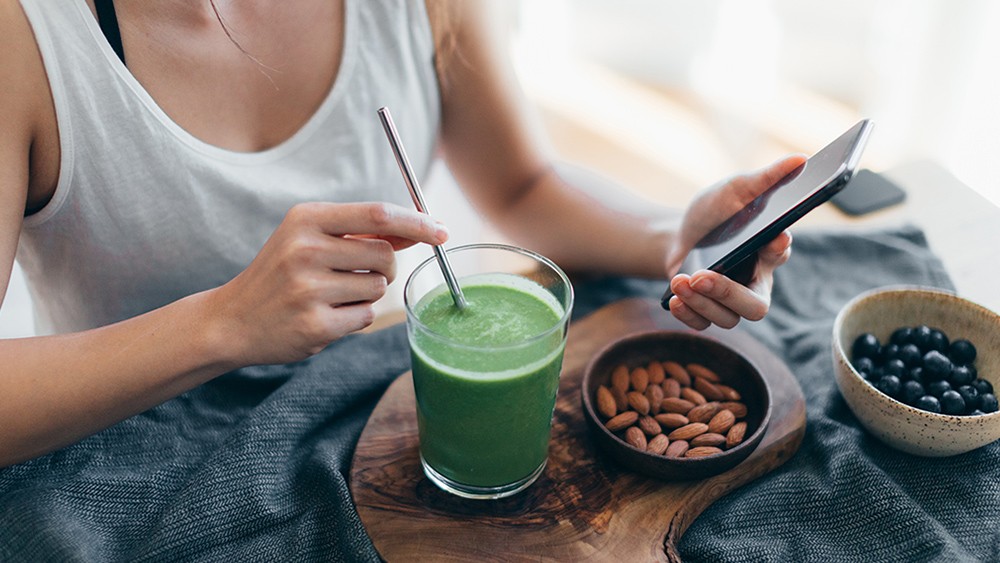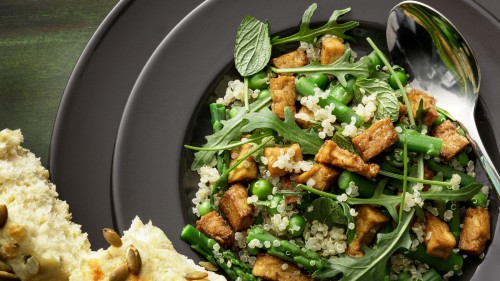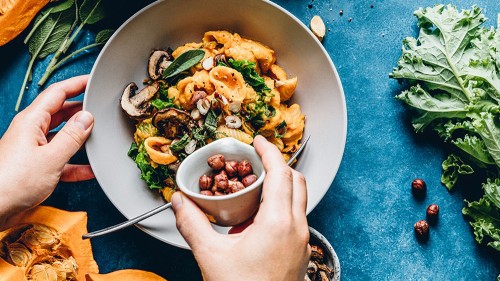Plant-Based Diet: A Dietitian Shares How to Get Started
Last Updated on January 14, 2022
Medically Reviewed by Anthony Dugarte, MD
Adopting a plant-based diet can sound like an overwhelming change to make, especially if you’re not used to eating this way or unsure where to begin. Here’s how to help make your plant-based diet transition smooth, enjoyable, and sustainable.


Changing your diet can be a challenge sometimes, but eating more plant-based can have significant benefits for your health.
Plants are loaded with vitamins, minerals, antioxidants, and lots of fiber. They are also low in fat, sugar, and unhealthy food additives.
Eating more plants helps you feel full, so it’s an easy way to crowd-out other unhealthy foods. For this reason, plants should be the foundation of your diet.
If you want to eat more plants, here are our best tips for adding more of them to your diet.
1. Identify Your “Why”
Like any major lifestyle or habit change, adopting a plant-based diet is only going to be sustainable if there’s a deep-rooted reason for doing so.
For example, many diet programs designed for quick weight loss may be effective in the short term but are challenging to stick to as a way of life.
One reason for this is that the individual doesn’t have a strong personal or emotional connection to the diet to fall back on once the initial goal is met.
Therefore, reverting back to old habits is common in these cases.
Plant-based eating allows the opportunity to connect with where your food comes from and how it impacts not just you but also the world around you.
Some people decide to try plant-based eating simply out of curiosity, and their continuance blossoms from there.
But for most people, the initial reason they decide to eat more plants and fewer animal products falls into one of four main categories:
Personal Health
Many people look to plant-based diets to help improve health conditions, such as diabetes management, heart health biomarkers, obesity, or inflammatory conditions. (1, 2, 3, 4)
Others may just want to improve overall habits with hopes of promoting longevity. (5)
Public Health
Industrial animal agriculture plays a substantial role in public health crises, such as antibiotic resistance. (6)
Destruction of the rainforest for beef cattle to graze also means that many plants needed to create life-saving medications are lost or may never be discovered.
Environment
How you eat dramatically impacts the planet we share.
For example, industrialized animal agriculture is a significant contributor to greenhouse gas emissions, water pollution, and rainforest destruction, all of which have further consequences that affect the whole world. (7, 8, 9)
Animal Welfare
While it can be hard to think about the animals themselves, making this connection is one of the driving reasons for many people to stop eating meat, eggs, fish, and dairy products.
Many people practice concern for animal welfare by removing personal support from systems that produce animal-derived food products.
Getting in touch with your underlying “why” is perhaps the most crucial piece to initiating this change in your lifestyle. What’s yours?
2. Clarify Your Goals
Once you’ve identified the main reasons pushing you toward a plant-based diet, start thinking about your personal goals. These should be specific to you and realistic to achieve.
Many people have specific health goals for adopting a plant-based way of life.
For example, you may want to kickstart a healthier weight loss journey to help lower the risk of health conditions that run in your family.
You may want to improve your blood sugar control and insulin sensitivity, reduce LDL “bad” cholesterol and triglycerides, or even improve your sleep pattern.
Keep in mind that, especially when it comes to health goals, it’s vital to adopt a plant-based diet that is predominantly based on whole plant foods (e.g., fruits, vegetables, nuts, seeds, legumes, and grains) and minimizes or excludes ultra-processed, sugary, and packaged foods that don’t offer the same health benefits.
With all of the options today, it can be easy to adapt what’s commonly referred to as a “junk food vegan” diet, which won’t offer you much in the way of tangible health benefits.
Other people may not be looking to go entirely plant-based and instead want to create goals like eating plant-based four days per week, or only eating animal products on the weekend.
Whatever your goals are, they should be unique to you and make sense for your lifestyle. You might find that making short-term and long-term goals is a helpful perspective to take.
3. Determine a Starting Place
The thought of doing a total diet overhaul is overwhelming for anyone. Instead of doing everything at once, identify a few areas where you could start making changes immediately.
I often encourage people to look at their current lifestyle in a big-picture format. Where are some areas you’re not feeling satisfied with your diet and could be more easily adjusted?
If you’re a visual person, it can be helpful to take a piece of paper and write down three days’ worth of current eating habits.
Record all of your meals, snacks, and beverages for these days. From here, you can better envision where initial changes may make the most sense.
For example, what do you eat for breakfast during the week? Could you swap out dairy milk for non-dairy instead? Have you ever tried a tofu scramble instead of an egg scramble?
Perhaps you notice that your dinner plate consistently has a large slab of meat on it, and you could experiment with some plant-based proteins in that place instead.
There’s no right or wrong answer here. Sometimes you just have to start somewhere and allow change to take its course.
4. Start Slowly
Making too many changes too quickly often results in disappointment.
While back-tracking certainly isn’t a failure, some obstacles may be avoided by taking things a little more slowly at first.
Some people can be very successful taking a “cold turkey” approach, meaning that they replace everything all at once. However, this causes extra anxiety that can impede your success for most people.
Perhaps it makes the most sense to you to just take a trip to the grocery store to see what plant-based items are available that you’d be interested in trying.
Maybe you’ll pick up a few to experiment with this week. Or, maybe your starting point is just getting your family on board with making a household change together.
5. Plan Your Week
Now that you’ve got your “why,” your mindset, goals, and plan of action in place, try planning your upcoming week out as it relates to your diet.
If you’re already a planner, this may come easily. If you’ve never practiced meal planning before, this may take a little more practice before it becomes a habit.
Looking at your week ahead, how many meals do you need to prepare at home? How many snacks are you planning to take to work?
If you can nail down what kinds of meals and recipes you want to make at home, you can create a grocery list from here and prepare things ahead of time.
If you’re planning to eat outside of your house or pick up food from a restaurant this week, it can be helpful to look at the menu ahead of time and identify some plant-based options now.
Eating a plant-based diet doesn’t have to be expensive, complicated, or time-consuming.
When you plan your week, remember that plenty of great meals can be made using low-cost ingredients, like tofu, canned beans, dry lentils, frozen veggies, grains, and fresh seasonal fruit.
6. Educate Yourself
Successful and sustainable plant-based diets are more than just knowing how to swap out ingredients in a recipe.
Regardless of the reason that initially pushed you to make this dietary switch, it’s helpful to continue educating yourself around the reasons why plant-based diets have so much to offer.
For example, if you made the plant-based switch to help animals, start researching the health benefits of reducing animal consumption.
If you started this diet for health reasons, look into how plant-based eating can benefit the environment.
Furthermore, having some nutrition knowledge is key.
A totally plant-based diet pattern often means that certain nutrients require a little more attention than they received previously.
For instance, knowing where you can find things like vitamins D and B12, iron, and iodine are pertinent, which brings us to the next tip.
7. Incorporate Supplements Where Needed
While plant foods are an incredible source of nutrients, certain ones are difficult to get enough of just from food sources.
This doesn’t mean that a plant-based diet is unsafe or inadequate; it just means that care should be taken to make sure you’re aware of where critical nutrients come from and how to get enough to prevent potential deficiencies that could develop over time.
Essential supplements on a plant-based diet for most people will include vitamins D and B12 and omega-3 fatty acids (which you can now find made from algae instead of fish if you prefer).
This is because very few plant-based foods naturally contain these critical nutrients.
Depending on the details of your diet, some people may also benefit from taking a supplement that contains iodine or iron.
Alternatively, many people find that taking a multivitamin covers many of these bases. Just be sure to read the nutrition facts panel to confirm that it contains what you’re looking for.
8. Find Inspiration
We’ve all been in a situation where we may have the desire to make a change but are suddenly out of ideas when it comes to actually putting it into practice.
Luckily, many people have adopted a plant-based diet before you, and many will continue to do so after you.
That means there’s plenty of inspirational content online or in books to help keep things fresh and enjoyable.
You can find great meal and recipe ideas by scrolling through Instagram or Pinterest, checking out some vegan or vegetarian blogs, or purchasing a plant-based cookbook.
Bookmark things that you really enjoy so that you can easily refer back to them again later.
9. Seek Out Support
Making lifestyle changes is much more fun when you have other people to bounce ideas off of and enjoy it with.
If you don’t know anyone personally who follows a plant-based diet, online communities are a good place to find some.
Most places have local or neighborhood groups online where you could post about plant-based friends or recipe swaps.
There are also numerous plant-based Facebook groups, where people share advice, ideas, and recipes daily.
In my experience, when one person decides to adopt a plant-based diet, they eventually have friends, family, or other acquaintances who take notice and become intrigued as well.
You never know who you might inspire to go on the plant-based journey alongside you.
10. Continue to Evolve
If there’s one thing we all know, it’s that change is constant and inevitable. When it comes to adopting a plant-based diet, being open to evolution is important.
Your goals and values may change over time, and that’s okay. What your diet looks like, including your preferences, may also change.
You may find that one approach isn’t working as well for you anymore and needs to be adjusted.
Plus, the plant-based food options continue to explode, meaning there will continue to be more options to choose from in years to come.
The point is that your plant-based diet is for you and not for anyone else.
Make sure you are practicing habits that are meaningful to you, eating foods you enjoy that are nourishing your body well, and are flexible to adapting things if and when you feel necessary.
The Bottom Line
Many people are choosing to adopt a plant-based diet for health, environmental, or animal welfare-related reasons.
Like any change to your lifestyle, the idea of switching to a plant-based diet may seem overwhelming at first, especially if you’ve been used to eating a lot of animal products.
Always speak to your doctor before making any drastic dietary changes, but they will likely support eating more plants.
A smart and intentional approach can help make the process of adopting a plant-based diet easier, more enjoyable, and more sustainable for you in the long run.
Identify your “why” for making the switch, determine your personal goals, outline how you plan to start making small changes, find some support, and don’t be afraid to try new things.
At WellnessVerge, we only use reputable sources, including peer-reviewed medical journals and well-respected academic institutions.
- A plant-based diet for the prevention and treatment of type 2 diabetes:
https://pubmed.ncbi.nlm.nih.gov/28630614/ - Plant-Based Nutrition: An Essential Component of Cardiovascular Disease Prevention and Management:
https://pubmed.ncbi.nlm.nih.gov/28887684/ - A two-year randomized weight loss trial comparing a vegan diet to a more moderate low-fat diet:
https://pubmed.ncbi.nlm.nih.gov/17890496/ - Anti-Inflammatory Effects of a Vegan Diet Versus the American Heart Association-Recommended Diet in Coronary Artery Disease Trial:
https://pubmed.ncbi.nlm.nih.gov/30571591/ - American Journal of Lifestyle Medine: Blue Zones, Lessons From the World’s Longest Lived:
https://www.ncbi.nlm.nih.gov/pmc/articles/PMC6125071/ - Antibiotic Use in Agriculture and Its Consequential Resistance in Environmental Sources: Potential Public Health Implications:
https://www.ncbi.nlm.nih.gov/pmc/articles/PMC6017557/ - Mitigating Greenhouse Gas and Ammonia Emissions from Beef Cattle Feedlot Production: A System Meta-Analysis:
https://pubmed.ncbi.nlm.nih.gov/30119602/ - Impacts of waste from concentrated animal feeding operations on water quality:
https://pubmed.ncbi.nlm.nih.gov/17384784/ - Forest-to-pasture conversion and recovery based on assessment of microbial communities in Eastern Amazon rainforest:
https://pubmed.ncbi.nlm.nih.gov/30544159/






